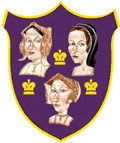Three dead Tudor queens are spending the rest of eternity locked up together in an antechamber in Hell or something very like it, given the lack of comfortable chairs each gently tormenting the other two to help pass the time.
Could this be a Tudorbethan version of Jean Paul Sartres Huis Clos?
Then along comes a new arrival, a former mistress of their mutual husband Henry, bringing scandalous news about three more wives who have followed them into the royal bed. And in no time they are falling out and squabbling like posh schoolgirls in a Jackie serial story, over which has the greater claim to a lasting niche in the annals of the realm.
Interestingly enough, all three have mothered incumbents of the royal throne, although at this date, 1543, it all lies in the future, while in the real world Henry waddles around the court with his sixth and canniest bride.
Remember that schoolroom mnemonic?
Divorced, Beheaded, Died;
Divorced, Beheaded, Survived
It may prove useful some day if one ever gets faced with a question on Millionaire about the fates of the six wives of Henry VIII.
Meanwhile with its first line used as the title, it signals that this latest play from the girls of Sweet FA features Catherine of Aragon, subject of a politically messy divorce; Anne Boleyn who famously got the chop on a trumped up charge of treason; and Jane Seymour who died shortly after presenting her doting husband with his sole surviving male heir, the future Edward VI
Playwright Graham Billings third collaboration with the company is this time co-written with Frederica Dunstan who also plays Jane Seymour. The problem for the audience is that both these authors have a long-standing knowledge, huge enthusiasm and burning desire to write a play about the politics and personages of the Tudor period.
Putting it frankly their three queens, plus Annes sister Mary Boleyn (for it is she), have each played a part in more English history than either they or the audience can reasonably consume at one sitting of a little under ninety minutes, including an interval. Some foreknowledge is also essential if one is to cope with all the name-dropping and hints at the political and religious effects of the Reformation, although the characters do their best to provide us with the back story.
Co-writer Dunstan is a pretty blonde Jane Seymour, lolling about when not bickering or involved in a punch-up with Anne Boleyn (there will be some bruises before the end of the run); otherwise resting on her royal laurels as Henrys favourite wife.
Company producer Alice Henley, who portrays Mary Boleyn, prettily suggests that the kings girlfriends were no strangers to the arts of lip gloss and glamourising eyeshadow. But as a rusticated exile from Henrys court she has grown too fond of farm life and the countryside to survive an after-death incarceration with these bossy-boot royals, as she she moons about, looking for an exit from Hell, perhaps located somewhere at the rear of this tiny theatre.
Liveliest character and most intriguing of the six wives, Anne Boleyn is vividly portrayed by Belgian actress Stephanie Fastre, self-proclaimed as a fizzing firework rather than a dull church candle, a woman who lived her life to the full, and still seeks fame and the bright lights.
But the best played, most fully defined character is Melanie Daggs Catherine, ever busy with her embroidered altar cloth when not making her devotions at a tiny sacred table downstage: a devout Catholic who also reveals the unexpected sexy side of her nature as she sketches the image of a seed-filled pomegranate as a symbol of her house and womanhood, while also remaining happily the true Queen of England at least in the eyes of Rome if not of Henry.
Well staged by Kit Thacker, using handsome hired costumes and a simple setting, this production can be recommended to scholars of English history.
